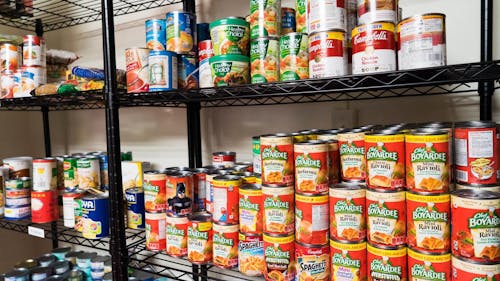Targum spotlight: Rutgers Food Pantry tackles food insecurity on campus

The Rutgers Food Pantry is 1 of the 20-plus pantries scattered across New Brunswick, but it is exclusively available to members of the Rutgers community.
Located in the Rutgers Student Center on the College Avenue campus, the pantry is available for walk-ins on Tuesday, Wednesday and Friday afternoons. The pantry also offers mobile services on the Busch, Douglass and Livingston campuses by appointment on Thursday afternoons.
Phillip Smith, assistant dean of Student Basic Needs, said that the pantry benefits students by providing them with a place that can meet their nutritional needs for free.
"Any current Rutgers students can come and use it, no questions asked," he said. "A lot of the food that we have in there is going to be good for the students to be able eat. So it's not going to just be ramen noodles, but there's going to be beans and rice and pasta and vegetables and things like that."
An inability to access affordable, safe and nutritional food constitutes food insecurity, according to New Jersey’s "Enhancing New Jersey College Students’ Access to Food, Housing and Other Basic Needs Supports."
An estimated 39 percent of students face food insecurity in New Jersey’s community colleges alone. Of these, 68 percent were employed, and a quarter of them worked more than 30 hours a week, according to the resource.
Services to address food insecurity at Rutgers began after the 2008 recession when the Dean of Students Office began distributing grocery store gift cards, according to the Rutgers Basic Needs Insecurity Report. The Rutgers Food Pantry began in 2016, offering food items and toiletries.
These resources grew throughout the coronavirus disease (COVID-19) pandemic according to Ross Perez, a graduate intern at the pantry who joined it in 2018. He said the pantry operated in the Graduate Student Center and dropped off bags of food at students’ doors during the time.
"Now we have this big room at the (College Avenue) Student Center, and we're slowly outgrowing that one too," he said. "So it’s kind of crazy to see how much we've grown and how much we still have to grow."
In the future, Smith, who oversees the pantry and similar resources, said he aspires to work with faculty to add information about the resource in syllabi, create a system to track student assistance and increase awareness of the pantry.
Awareness of the pantry has grown over time, according to the Rutgers Basic Needs Insecurity report. Data presented in the report showed student knowledge of the pantry approximately doubled from 2016 to 2019 and the pantry's use went from only 0.3 percent in 2016 and grew to 3.1 percent in 2019.
Spreading knowledge about the pantry and reducing any negativity or apprehension students may experience in accessing it can standardize the use of such resources, Perez said.
"There's such a stigma behind food pantries and just generally needing something," he said. "I think if you're more vocal about it, that can always help alleviate the stigma and just make it seem like a normal thing."
Smith said increased access to such resources enables students to succeed in classes and beyond. By earning their degrees, students can then support themselves and their families over time.
Students can donate items to the pantry by hosting drives or directly delivering goods individually to the Rutgers Off-Campus Living and Community Partnerships office on 39 Union Street, he said.
The pantry offers guidance on how to host drives on its website. Interested individuals can also offer monetary donations through the site but requests that individuals fill out a form prior to doing so.
"As a community, we continue to really connect and help and work together in fighting this," Smith said. "It’s just the food pantry won't be so much of, say, a band-aid for things. We can hopefully maybe fix things and change the cycles or generational curses."



